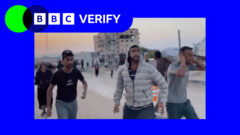The ongoing conflict between Israel and Hamas raises alarming questions about war crimes and genocide, as international bodies and experts scrutinize the actions of both sides. With civilian casualties mounting and accusations of legal violations echoing globally, the future of diplomatic relations and accountability hangs in the balance.
Israel's Conduct in War Faces Intense Scrutiny Amid Accusations of Genocide and War Crimes

Israel's Conduct in War Faces Intense Scrutiny Amid Accusations of Genocide and War Crimes
As the conflict escalates, serious allegations surface against Israel, prompting questions about international legal responsibilities and potential long-term consequences for governments involved.
Even amidst the chaos of war, certain fundamental rules are supposed to govern conduct on the battlefield—rules designed to protect civilian lives and dictate humane treatment. The Geneva Conventions, adopted in the aftermath of World War II, stand as a testament to this ideal, stating that no country is above the law, not even Israel following its brutal surprise attack by Hamas on October 7, 2023.
While the violence erupted with the loss of 1,200 Israeli lives—many civilians—similar scrutiny is falling on Israel as it continues military operations in Gaza, where reports indicate staggering civilian casualties. By January, UNICEF documented the deaths of around 14,500 Palestinian children, raising urgent questions regarding Israel's adherence to international humanitarian law.
The International Committee of the Red Cross (ICRC) headquarters in Geneva serves as a solemn reminder of these legal obligations, but a fog of war obscures clarity. Access to Gaza is heavily restricted, making it exceptionally difficult for journalists to gather information. With at least 181 media workers killed, nearly all Palestinians, the inherent risks of reporting complicate the narrative further.
The Israeli government seeks to maintain control over the story, allowing reporters to document the aftermath of Hamas's attacks while restricting access to Gaza, indicating a desire to mitigate external perceptions of their military actions. Within Israel, Prime Minister Benjamin Netanyahu faces fierce political opposition and accusations of prolonging warfare not for national security, but to sustain his political coalition while avoiding accountability for pre-war security failures.
Legal experts argue that Israel's conduct risks being categorized as war crimes, with potential allegations of genocide stemming from its military strategy. Amidst growing dissent from Western allies, European leaders are calling for immediate halts to Israel's military actions, citing disproportionate responses and rising humanitarian crises.
Mirjana Spoljaric, President of the ICRC, expressed deep concern for the deteriorating conditions in Gaza, stating that humanity is failing, with civilian protections evaporating. She warns that the disregard for the laws of war erodes fundamental rights globally.
On the ground, mounting evidence suggests the toll of military actions on Palestinian civilians is catastrophic, as the flow of humanitarian aid becomes critically restricted. British officials have openly accused Israel of employing hunger as a method of warfare, a move universally condemned under international law.
As international scrutiny intensifies and the legal ramifications for Israel become more pronounced, the discourse surrounding the morality and legality of the ongoing conflict has become fraught with complexity. Whether Israeli actions lead to war crime proceedings, and how global leaders navigate these accusations, remains to be seen, but the matter of accountability and justice looms large on the international stage.
The potential for international criminal investigations, including warrant issues against key Israeli figures handled by the International Criminal Court, underscores the severity of the situation, with outcomes that could reverberate through diplomatic and geopolitical relationships for years to come.
As discussions of genocide allegations emerge, Israeli leaders reject these claims, citing the growth in the Palestinian population; yet legal experts caution that intent is critical in proving genocide and assert the justification of force must adhere to the rules of war.
The current crisis carries with it not only immediate humanitarian concerns but also raises existential questions about the future conduct of nations in conflict and the broader implications for the application of international law. Eyewitness accounts and analyses of the destruction within Gaza further fuel the urgency for transparency and accountability, as the world watches closely.



















